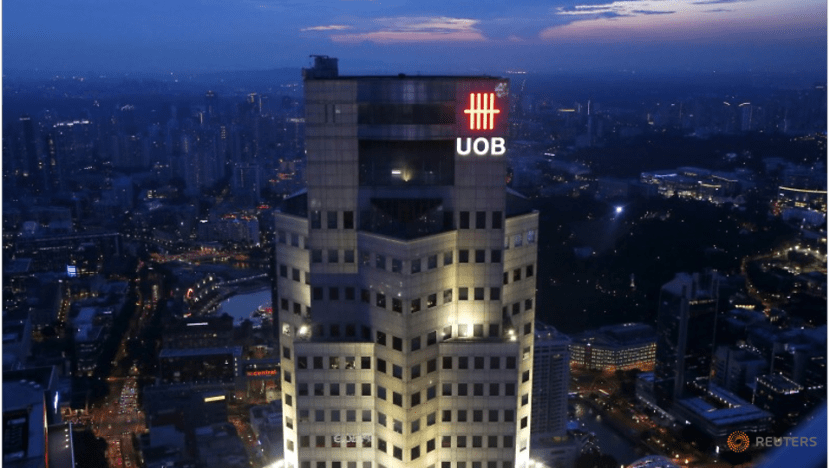UOB Q2 net profit rises 28%, beats estimates

The United Overseas Bank (UOB) Plaza building is pictured in Singapore's central business district. (Photo: Reuters/Edgar Su)
SINGAPORE: United Overseas Bank (UOB) posted a 28 per cent increase in second quarter net profit to S$1.08 billion, smashing estimates.
Analysts polled by Bloomberg were expecting a lower net profit of S$954 million.
The growth in the lender’s net profit was supported by higher net interest income and fee income.
Net interest margin - which is a key gauge of a bank’s profitability - came in at 1.83 per cent in the second quarter, 8 basis points higher than 1.75 per cent a year earlier.
Net interest income grew 14 per cent to S$1.54 billion, supported by the improvement in net interest margin and a 10 per cent increase in loan growth.
The bank has declared an interim dividend of S$0.50 per share for the second quarter, higher than the dividend of S$0.35 per share a year ago.
“Testament to our focus on generating sustainable growth, our second quarter results are built on the healthy growth momentum in the first quarter," said UOB’s deputy chairman and chief executive officer Wee Ee Cheong.
"Such discipline supports our ability to reward shareholders with an increase in interim dividend per ordinary share to 50 cents."
With its second quarter numbers, UOB posted record net earnings of S$2.05 billion for the first half of the year, up 24 per cent from a year ago.
However despite the positive results, UOB’s outlook for the rest of the year, like DBS - which announced a 20 per cent jump in net profit for Q2 on Thursday - remains cautious.
The bank has cited downside risks like the mounting trade tensions between the US and China which could hurt the Chinese economy, as well as the impact of the recently announced property measures in Singapore - both of which could have significant impact on the lender’s loan growth going forward.
Among peers DBS and OCBC, UOB is the highest exposed to housing loans, with exposure standing at 28 per cent.
However, UOB said it remains well-positioned to weather these risks, through its continued investments in technology and its staff, as well as its moves to strengthen connectivity in the region.
"In the face of rising uncertainty globally, our stable asset quality, robust capitalisation and diversified funding base put us in a strong position to drive future growth," said Mr Wee.
"We will remain vigilant, nimble and continue to invest in capabilities to serve our customers’ evolving needs."
He added: "As a long-term player, we remain steadfast in augmenting our regional footprint to extend our reach to a wider group of customers and to tap the region’s connectivity potential."
Mr Wee also told reporters at a briefing that the bank does not expect housing loans growth to fall in the short term, given the “progressive drawdown of loans booked previously”.
He added that UOB has maintained its housing loans growth forecast at 6 to 7 per cent, though housing loan activities could see some impact.
“Looking at some of the housing loan activities, I would expect a drop of 10 to 20 per cent in housing loan applications (for the second half of this year). Prices could fall 5 to 10 per cent in time,” he said.
“We maintain our market share of new sales in Singapore despite competition in the financing market. However, in the next few months, we expect transaction volume to decline in response to recent cooling measures.”















